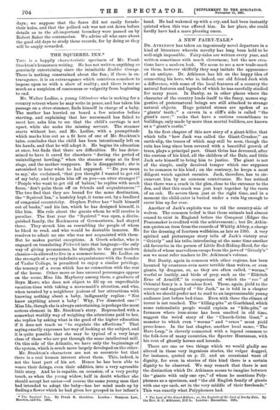THE SQUIRREL INN.* This is a happily characteristic specimen of
Mr. Frank Stockton's humorous writing. He has not written anything so genuinely entertaining since the inimitable Rudder Grange. There is nothing constrained about the fun ; if there is ex- travagance, it is an extravagance which contrives somehow to impose upon us with a show of reality ; and there is not so much as a suspicion of coarseness or vulgarity from beginning to end.
Mr. Walter Lodloe, a young litterateur who is seeking for a country retreat where he may write in peace, and has taken his passage on a river-steamer, finds himself in charge of a baby. The mother has hurried on board a few minutes before starting, and explaining that her nursemaid has failed to meet her, asks him to see that the child's carriage is not upset, while she seeks the missing servant. The steamer starts without her, and Mr. Lodloe, with a promptitude which marks him out as a fit hero of one of Mr. Stockton's tales, concludes that the child has been intentionally left on his hands, and that he will adopt it. He begins its education at once, but finds that there are difficulties. He has deter- mined to have it cared for elsewhere " during the period of unintelligent howling," when the steamer stops at its first stage, and the mother reappears. He is disappointed ; she is astonished to hear what he had supposed. " Do you mean to say,' she exclaimed, that you thought I wanted to get rid of my baby, and to palm him off on you—an utter stranger ?' People who want to get rid of babies,' he replies with much force, don't palm them off on friends and acquaintances." The two find that they are bound for the same destination, the " Squirrel Inn," a hostelry kept, it turns out, by a landlord of congenial eccentricity. Stephen Petter has " built himself out of books," and his inn, which he has designed himself, is like him. His rule about the guests whom he will receive is peculiar. The first year the " Squirrel " was open, a distin- guished family, the Rockmores of Germantown, had stayed there. They struck him as resembling the people of whom he liked to read, and who would be desirable inmates. He resolves to admit no one who was not acquainted with them. But he makes partial exceptions. A Greek scholar, who is engaged on translating Pickwick into that language—the only way of giving permanence, he thought, to the great modern classics—is allowed to live in a summer-house. Mr. Lodloe, on the strength of a very indefinite acquaintance with the founder of Vashu. College, is permitted to enjoy a similar privilege, the tenancy of a room which has no connection with the rest of the house. Other more or less unusual personages appear on the scene, Miss Ida Mayberry among them, a graduate of Bryn Mawr, who does not object to fill up an unprofitable vacation-time with taking a nursemaid's situation, and who, when taunted by a neighbour jealous of her attractions with knowing nothing about a baby, indignantly replies : " Not know anything about a baby ! Why, I've dissected one !" Miss Ida, though she is always entertaining, is perhaps the most serious element in Mr. Stockton's story. Reproached with a somewhat worldly way of weighing the attentions paid to her, she replies by asking what is the good of the higher education if it does not teach us " to regulate the affections." That saying exactly expresses her way of looking at the subject, and it is quite possible that she may be typical of a very large class of those who are put through the same intellectual mill. On this side of the Atlantic, we have only the beginnings of the system, which is much more largely developed on the other.
Mr. Stockton's characters are not so eccentric but that there is a real human interest about them. This, indeed, is not the least part of his art. Hence he has been able to weave their doings, even their oddities, into a very agreeable little story. And he is capable, on occasion, of a very pretty touch, as when the young widow, half in doubt whether she should accept her suitor—of course the same young man that had intended to adopt the baby—has her mind made up by finding a flower which he had given her grasped in her infant's
• The Squirrel Inn. By Prank R. Stockton. London : Sampson Low, Marston, and Co. 1891.
hand. He had wakened up with a cry, and had been instantly quieted when this was offered him. In her place, she could hardly have had a more pleasing omen.


















































 Previous page
Previous page